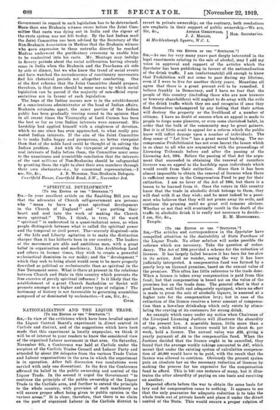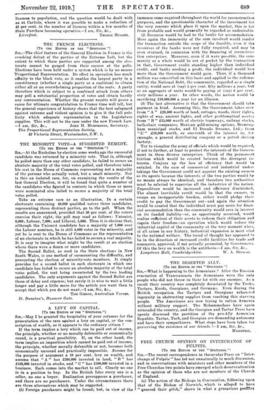(To THE EDITOR OF THE " SPECTATOR.") SIR,—The articles and
correspondence in the Spectator have compelled attention to the desirability of State Purchase of the Liquor Trade. No other solution will make possible the reforms which are necessary. Take the question of redundancy. The Act of 1904 provided a scheme for the reduction of licences. It has largely failed because it has been far too slow in its action. And no wonder, seeing the way it has been judicially interpreted. A compensation fund was formed by a yearly levy on licensed premises, based on the annual value of the premises. This often has little reference to the trade done. When a licence is taken away compensation is paid from this fund; but that compensation is based, not on the value of the premises .but on the trade done. The general effect is that a good house, well built and adequately equipped, where no effort is made to press the sale of alcoholic liquors, is assessed at a higher rate for the compensation levy; but in case of the extinction of the licence receives a lower amount of compensation than a low-class drink-shop which only exists by stimulating the craving of its customers for strong drink.
An example which came under my notice when Chairman of the Liverpool Licensing Justices will illustrate thp absurdity of the present law. A miserable house, little more than a cottage, which without a licence would let for about 8s. per week, held a licence. The annual value was £28, giving a yearly payment of £4 to the compensation fund. When the Justices decided that the licence ought to be cancelled, they found that the average weekly takings amounted to £47, which meant that under the existing system of calculation compensation of £6,000 would have to be paid, with the result that the licence was allowed to continue. Obviously the present system puts an absolute bar on the necessary reduction of licences by making the process far too expensive for the compensation fund to afford. This is hilt one instance of many, but it illustrates the utter absurdity of paying on one basis and receiving on another.
Repeated efforts before the war to obtain the same basis for levy and for compensation came to nothing. It appears to me that the only guarantee for adequate reduCtion is to take the whole trade out of private hands and place it under the direct control of the State. This would ensure a proper relation of
licences to population, and the question would be dealt with as at Carlisle, where it was possible to make a reduction of 42 per cent, in the number of licences within a few months of State Purchase becoming operative.—I am, Sir, &e.,
LirerPool. THOMAS HUGHES.







































 Previous page
Previous page